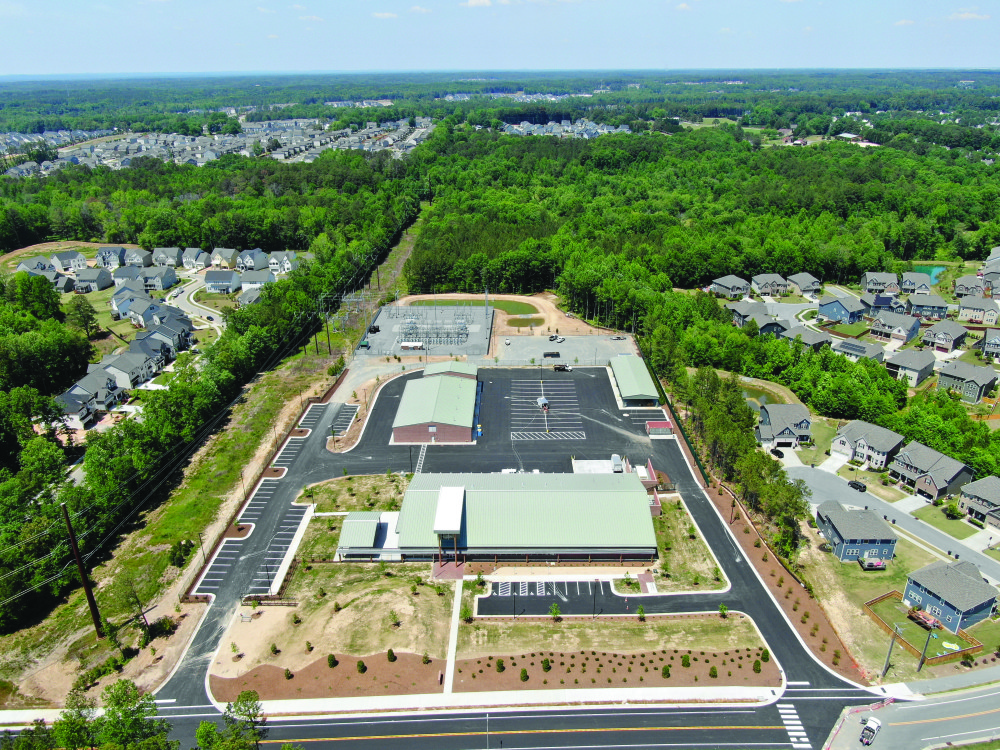Every morning, the first thing I do is pour water into the coffee pot, add the coffee, and then something mysterious happens. I press a button, and power from somewhere I never think about, lights the brew button and starts my day.
All of us who live here know that Apex is a unique place in many respects. Beautiful neighborhoods, good schools, pleasant parks and a lively downtown are just a few of the attributes that have made our community special. But there is a little-known component of Town government that we give only a passing thought, and that’s when the monthly electric/water/refuse bill arrives in the mail. Apex is one of just 70 North Carolina communities that maintains its own electric utility. Most residents and businesses in our state are electric customers of Duke or other for-profit corporations, but many years ago Apex decided to take this essential service into its own hands. The Apex Electric Utilities Department powers and lights our community, day in and day out.
Powering a growing community is no simple task. There are miles of transmission lines, multiple substations, thousands of street lights, a fleet of specialty vehicles for installation and maintenance and, of course, skilled personnel to keep things running so smoothly that residents and businesses don’t have to think about it much. To learn more and better understand this monumental undertaking, Suburban Living turned to Electric Utilities Director, Eric Neumann.
SL: Eric, why did Apex establish its own power company, and could you offer a little history?
EN: In 1917, Apex started providing electricity to the town. Like most municipal providers, the origin of service arose from emergent technology advancements that provided a better quality of life for its residents. As surrounding cities and towns embraced the electric generator and incandescent light, there was a push to provide similar services in Apex. Since transmission of power over long distances was not practical at the time, it became apparent that the only way to provide this service was to do it locally. As the technology became more prevalent and the town grew, there was a natural migration toward consolidation and the development of large, centralized generation and distribution. Many of these smaller municipals merged and eventually formed into investor-owned utilities. Towns and cities that saw the value in maintaining that service to their residents were allowed to retain these services, and this was codified in state and federal law that continues to govern municipal electric operations today. One in seven customers in the US receives power from a public power utility—49 million Americans in 49 states.
SL: What are the benefits to residents and businesses?
EN: Since public power utilities are community owned and not for profit, all their efforts are naturally focused on serving their residents. Maintenance of our facilities is a top priority for the Apex Electric Utilities Department to ensure our reliability. To achieve that, our facilities are continually evaluated and upgraded prior to failure. Our competitors at investor-owned utilities are laser focused on reducing expenses and making a profit. We get little pressure to reduce our efforts related to maintaining our facilities. A key component of our reliability program is our tree trimming operation. We do not outsource our trimming, maintaining control of those efforts internally. We have three fully certified arborists on our staff who understand the need for keeping our lines clear, but balance that with the need to preserve the health and beauty of the trees. Any trimming that is performed is done with the understanding that risk of a storm-related outage is reduced and that the health of the tree is maintained or improved after trimming. Every member of the electric utilities team is mindful that to be successful our focus must always be on the customer. Municipal customers are our residents and local businesses; with investor utilities, the ultimate customer is the shareholder.
SL: How does the Town achieve and maintain the lowest possible costs?
EN: Since we don’t have a profit motive, we focus on providing a service that is expected from our customers. Most of the expectations are generally set by capabilities and services that can be provided by the industry as a whole. For us, that is Duke. Our philosophy is to outperform those expectations and to maintain parity in cost. Over the years, our council as well as town management has implemented a strategy to keep our rates in line with our neighboring utilities. The revenue generated through this philosophy has allowed us to invest in activities that maintain our award-winning service to the citizens and businesses of Apex and allow us to keep up with the fast pace of growth the town has experienced over the last 20 years.
SL: How are the rates set and by whom?
EN: Typically, we have an outside consultant review our existing rates and financial objectives, and then work with our finance organization to craft potential changes. Input is provided by various organizations within the Town that identify areas where we think changes will support policies / initiatives that the council has identified previously and work toward recommendations that satisfy these requirements. These recommendations are reviewed by various committees and their input is evaluated. Then, recommended rates are included in the annual budget document and eventually are presented to the public for comment. Like all budget and finance decisions, the residents and Town Council ultimately determine the rates going forward.
SL: What is the Town’s record on reliability, particularly during storms?
EN: Municipal power regularly outperforms investor-owned utilities with respect to reliability. Nationally speaking, the average municipal customer experiences 62 minutes of no power while the investor-owned typically experiences outages of around 150 minutes over the same period. During major storms and hurricanes, the Town typically has restored power to all its residents in half the time of neighboring utilities. The Town of Apex continually performs in the upper quartile for most of the tracked metrics. [See the summary of some of the recent recognitions received by the Town. Most are either directly related to reliability or have a positive impact on our ability to perform at a level expected by our residents.] When a storm or other impact on the system creates an outage, we are never far, in distance or time, from affecting a restoration solution. I encourage Apex customers to download our “Apex Outage” app. In addition to being able to quickly report if you’ve lost power, the app offers other useful information.
SL: How does the Town interact with other electrical entities?
EN: The Town of Apex is a member of two very important organizations: the APPA (American Public Power Association) and ElectriCities of NC. These organizations enable municipal power to compete with and provide the services of an investor utility. Through our affiliation with these organizations, we meet regularly with our municipal counterparts and tackle issues important to our members. Apex may only have 34 employees dedicated to providing electric service to our 25,000 customers, but we have access to the employees of both of these organizations to support our efforts (bulk power negotiations, lobbying in Washington, rate making options, engineering support, customer service, training). During major storm events, we collectively work together to share resources (equipment, personnel, materials) to support the restoration efforts. We know that if Apex is hit by a major hurricane, that Duke Progress is also struggling to restore power. Those limited contract resources needed to rebuild both systems may have been committed elsewhere. Working with APPA and ElectriCities, we have access to resources in unaffected communities that are mobilized and ready to support us.
SL: How is the mission of the Electric Utility Department enhanced by the new facility on Milano Avenue?
EN: The new facility will allow for consolidation of all our resources in one location. Presently, we have materials and equipment staged in various locations across the town that require time for us to gather during emergencies. Having all the materials and specialized equipment in one location will allow us to decrease our response time during events. Additionally, most of our equipment is presently stored outside, exposed to the weather. Our new facility will allow us to protect this expensive equipment, prolong its life and reduce maintenance costs. Pulling our electric staff out of existing town facilities will allow other departments to expand without having facility constraints. Our public works organization in general has not added new space in more than ten years and has not kept up with the growth of town services. Since our location is strategically co-located at our newest substation, our ability to respond to emergencies in that area will be enhanced. This substation serves the area of Apex experiencing the largest growth and will minimize travel time for construction/restoration of needed facilities.
SL: What are the future plans for the Department?
EN: The Electric Utilities Department plans on increasing its focus on integrating technology that enhances the customer experience with their energy needs. There have been monumental advancements in cost effective technology that provides or enables capabilities that our customers are looking for. One is the AMI (Advanced Metering Infrastructure) system that provides consumers with information about their energy usage so they can make informed decisions. Another is integration and expansion of our SCADA (Supervisory Control and Data Acquisition) system that will provide accurate and timely intelligence about our system operational ability. This will allow us to make better financial decisions. We plan on replacing our aging lighting system with new LED (Light Emitting Diode) technology. This conversion will reduce energy usage by two-thirds and help us contain our overall power purchase costs. We will look for ways to maximize the benefits afforded us by having a new facility with consolidated resources located in one location. Additionally, we will look for ways to better support town activities through the use of our talented staff to increase the quality of life in the “Peak of Good Living.”
Reliable Public Power Provider – Platinum (RP3) – American Public Power Association (2020-2022)
Public Power Award of Excellence – Grid Modernization (2020)
Public Power Award of Excellence – Reliability (2019 & 2020)
Certificate of Excellence in Reliability – American Public Power Association (2019 & 2020)
Public Power Award of Excellence – Workforce Development (2019 & 2020)
Reliable Public Power Provider – Platinum (RP3) – American Public Power Association (2009-2010)
Public Power Award of Excellence – Customer Service (2008 & 2009)
Public Power Award of Excellence – Communications (2008 & 2009)
Public Power Award of Excellence – Energy Efficiency (2008 & 2009)
Reliable Public Power Provider – Gold (RP3) – American Public Power Association (2007-2008)
Municipal Electric Safety Award – For No Time Lost – American Public Power Association (1997-2007)








